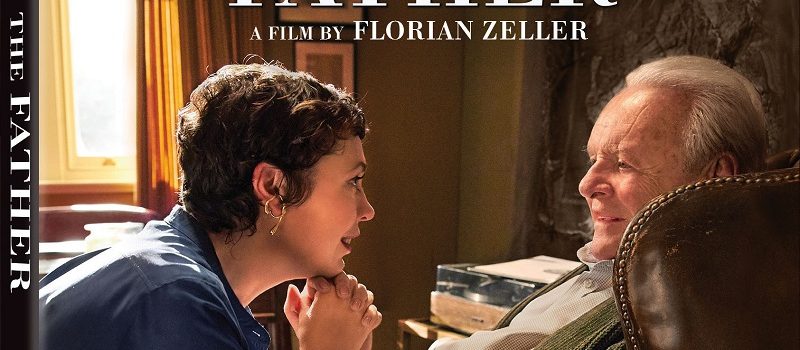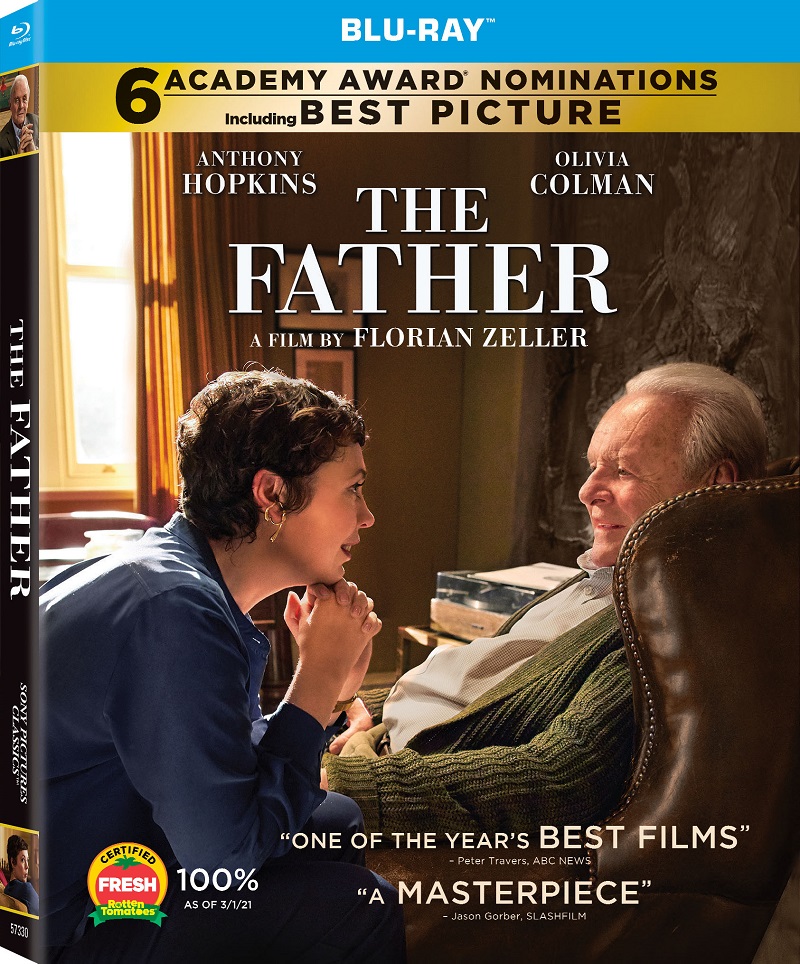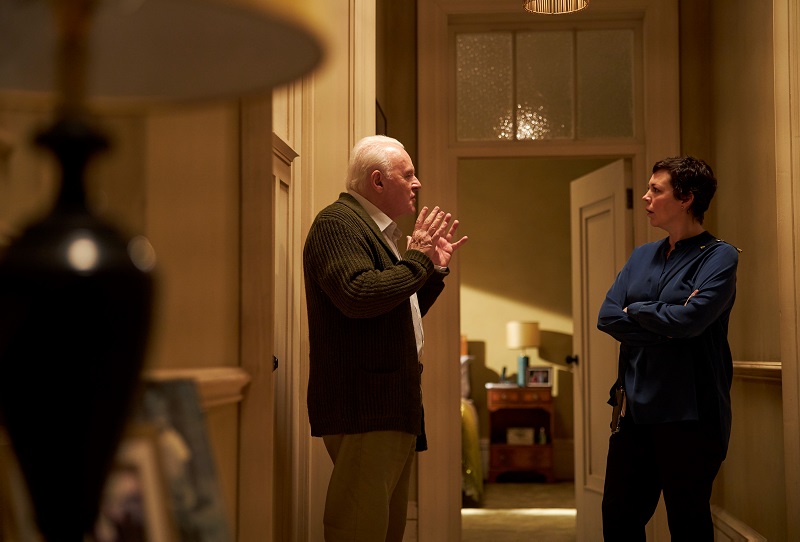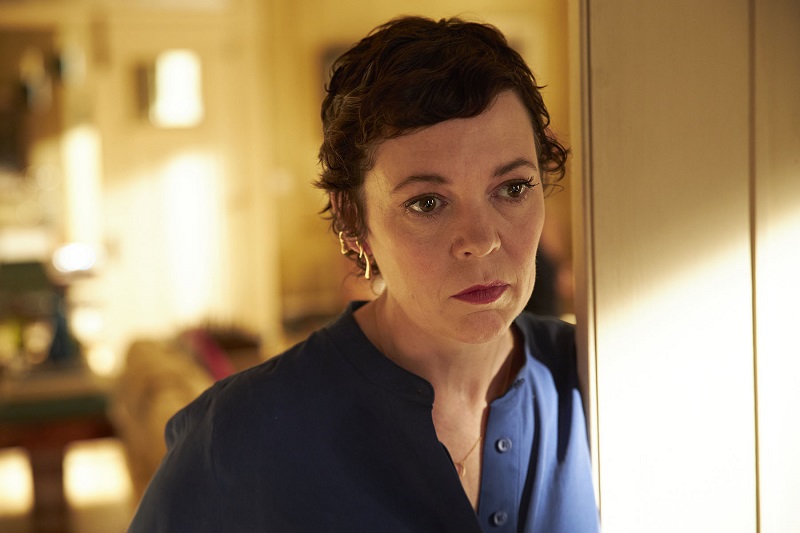Sometimes a film comes along that befits a larger societal sentiment and discussion. That is exactly what occurs with the Blu-ray of The Father, starring Anthony Hopkins and Olivia Colman as a father-daughter. What’s so magical about the Florian Zeller written and directed effort, is that the viewer is completely unaware that as the spools of film progress, there is a subconscious demand our brain puts on us to think about our own health proactivity.
After experiencing The Father and knowing that the perils of old age have a habit of cutting us off at the knees, the movie will have you immediately concerning yourself not only with being healthy but thinking beyond our physical and making plans for our future mental demands as well.
The health issues with Hopkins’ character Anthony, are subtle. That is until they are not. The crux of the plot details of The Father revolves around the pair as they navigate and grapple with some rather difficult challenges. The daughter, Colman’s Anne, has been there for her father extensively and almost exclusively—even overseeing the cleaning and maintenance of his beloved London flat.
Sadly, it is an all-too-familiar situation for countless middle-aged children of older parents. In the Zeller (the Frenchman makes his cinematic directorial debut) helmed drama that will gut you emotionally, the elusiveness of memory loss is actually something that has drifted into the “quite common” territory.
The manner with how Zeller shot The Father relies heavily on and is inseparable from cinematographer Ben Smithard. The DP plays an enormous role in adding dramatic weight evenly throughout. Too many details in this arena will find me drifting firmly into spoiler territory. Let’s just say this: Zeller portrays the devilish effects of our memory and how it plays tricks on us. It can be something as simple as, “Where are my glasses?” to bills falling through the economic cracks and the electricity gets turned off.
The Father features Oscar winners in each of the significant roles. Having that level of excellence cannot be emphasized too much. Zeller has veteran thespians being able to convey a cornucopia of the human emotional spectrum. Colman won her Academy Award just last year for her mesmerizing turn as Queen Anne in The Favourite, while Hopkins infamously won his Oscar for the still gives us the creeps, The Silence of the Lambs. As soon as the film concluded, I knew that Hopkins deserved that Oscar he won for Best Actor. The stunner also took home an Oscar for Best Adapted Screenplay.
This is a critical issue as we move forward as a society. As science and better living contribute to folks continuing to push and extend that life expectancy figure, not only will memory loss, dementia or Alzheimer’s occur more often, but it will plague families, medical professionals, friends, and extended family alike.
Like in The Father, that journey from living independently to moving into a facility that specializes in memory loss and its related issues can be a tough call not only for the person at the center of the discussion but also for their family. After all, long before memory loss issues created masses of people in need of personalized care, the “talk” between the family members going through these issues and those who love them—and want the best for them—has been exponentially growing in numbers.
With that as our backdrop, how Zeller shot his film astoundingly contributes to getting inside the head of Hopkins’ Anthony. For the subject, this is a tragic moment, our loss of control of life. With memory being hazy and now blurry, what is real and what is being imagined commences at this part of the film and it is now a minefield.
One can tell that The Father is based on a play. The production design and set of Zeller’s film are simple, yet one must look deeply because there is a lot going on here cerebrally and if you blink, you’re likely to miss something. Lucky for us, the screenplay adapter is the same person who is the playwright and that is Zeller. It’s a simple layout too, there’s a hospital room and then there’s Anthony’s flat.
Who knew that a family drama centered around a daughter in Coleman’s Anne wanting the best for her father medically and psychologically would pain so deeply? It’s never spoken, but there’s an entity that permeates The Father that is like the filmmaker and the studio has set off a warning that will strike us each firmly in the soul and in a way that is crushing. There is no avoiding this subject matter. To do so, would be like an Ostridge burying its head in the sand.
Coleman plays the dutiful daughter brilliantly and even on occasion has to hear things from her father that has to hurt deeply. She has found happiness after years of misery and divorce. Yet, she has this issue with her father to contend with that largely seems thankless at the best and cruel at the worst. It takes an actress of her stature and gifts to truly encapsulate all of the emotional sentiments that ricochet through a child’s head as we sit here and witness our first heroes, our parents, descend into a landscape where many days—they don’t even know who we are.
The actress’s character Anne has finally found love and the tragic aspect of this equation is that after years of swinging and missing, she has met someone who is her soulmate. But… he lives in Paris. Normally, moving to the French capital would be a dream. But with a father slowly losing his faculties, being in a different country can be a double-edged sword. With Coleman’s gifts, this element is handled with grace and power worthy of the subject matter.
Then, there’s Hopkins. He headed into this production with one Oscar win under his belt. It seems as if him winning another for his portrayal of a man on the edge of losing his mind could be a reach, given that he is up against a sentimental favorite in the form of Chadwick Boseman—for his electric and stunning work in Ma Rainey’s Black Bottom. But let’s be clear. The moment the film ended the first time I witnessed it my wife became seriously worried about me!
What Hopkins does, in particular, with the film’s final moments alone is what should guarantee him an Academy Award. It is tragic. It is as spellbinding as it is keenly kinetic.
It’s as deeply personal as an actor can get with a performance. It is what it is and as difficult as it is to hear, every single one of us will go through a moment like this at some point as our years on this earth begin to dwindle.
As handled by Hopkins, it may be his best work yet—and yes, that is saying something. It is a tour-de-force performance from beginning to end. I cannot even imagine where the legendary actor started this journey. But I can tell you where it concluded. One of the most iconic performances by a performer in years.
Zeller has hit a nerve with The Father that I’m still trying to unravel from. Not only will it force a conversation between parents and children that needs to happen before memories start to fade, but his film will go down as a must-see flick for anyone who is a parent or has been a child.
Bonus features add layers to the resonance of The Father Blu-ray and most importantly, showcases how the film achieves its brilliance as it further shines a light on the brilliance of Hopkins and Coleman.
Perception Check: Portrait of The Father is a stunning eight-and-a-half minute featurette as the cast and crew delve deeper into how they successfully brought the original play (that was in French no less) to the screen. This bonus feature also adds insight into the structure of the story itself and how that was the key element to the entire thing working or not.
Of course, as explained further in the review of the film above, Zeller’s direction was integral to its emotional reverberation. Homecoming: Making The Father is a terrific look at Zeller’s genius, but it frames it in a manner that further elevates the material (if that is even possible).
Film Grade: A+
Bonus Features: A




